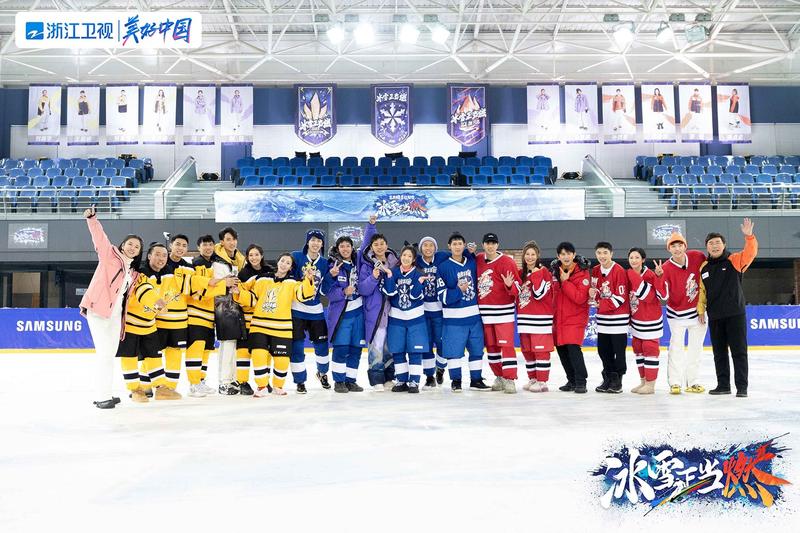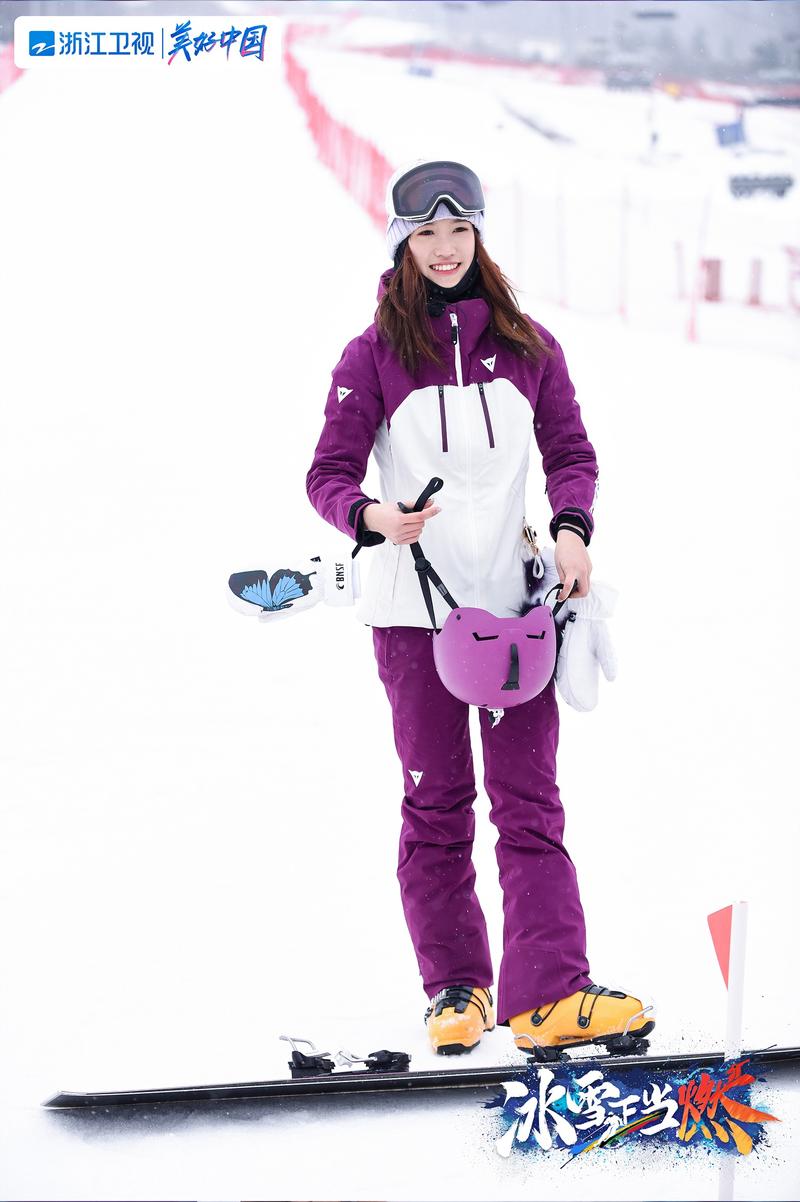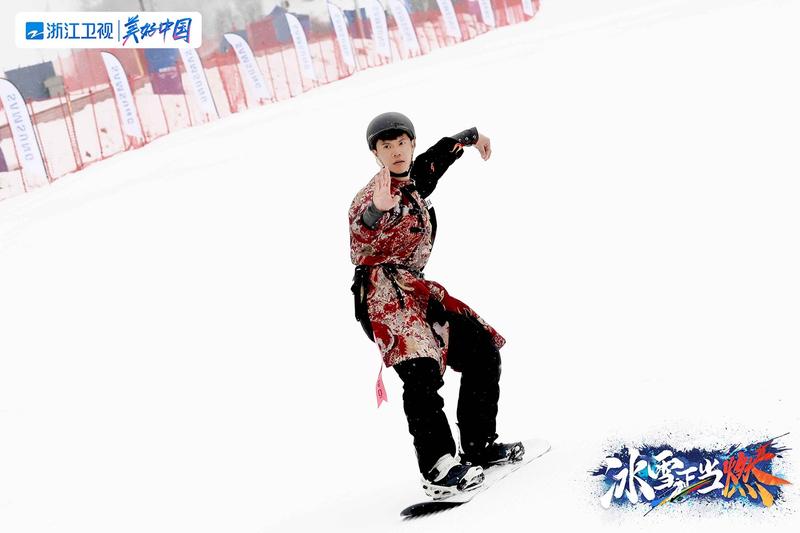TV program on winter sports and leisure activities draws large audience, Zhao Ziyu reports.
 Participants of the TV show Ice on Fire pose in Changchun, Jilin province. (PHOTO PROVIDED TO CHINA DAILY)
Participants of the TV show Ice on Fire pose in Changchun, Jilin province. (PHOTO PROVIDED TO CHINA DAILY)
Skating in front of cameras, Wu Chun, an actor from Brunei who now works in China, spoke enthusiastically about winter sports, a new experience for him.
"It is charming and inspiring," Wu says. "I have learned a lot about figure skating."
He and his teammates were practicing before performing in a show, called Ice on Fire, on Zhejiang Satellite TV.
"I finally understand the meaning of 'one minute onstage and 10 years offstage' when working alongside national athletes," he says. "Glory and honor is hard to win."
The TV show is among the latest reality programs related to China's successful hosting of the Beijing 2022 Winter Olympics in February.
In the show, famous entertainers like Wu, professional athletes and winter sports enthusiasts form teams to compete in varied ice and snow games-sometimes just for fun.
 Zhang Yaning, a New York University student, is one of the winter sports enthusiasts joining the TV show. (PHOTO PROVIDED TO CHINA DAILY)
Zhang Yaning, a New York University student, is one of the winter sports enthusiasts joining the TV show. (PHOTO PROVIDED TO CHINA DAILY)
The weekly show had been aired on Zhejiang Satellite TV from Jan 7 to April 2. Its popularity remains on streaming platforms-the total number of views online has reached 1.8 billion, placing it top of Chinese social networking service Sina Weibo's variety show rankings.
"The Winter Olympics have lit Chinese people's enthusiasm for winter sports. That's one of the reasons why we have so many viewers," says Chen Muxiang, a scriptwriter of the show.
After Beijing won the bid in 2015 to host the Games, the government announced its commitment to engage 300 million people in winter sports activities in the country.
According to Tu Xiaodong, director of the publicity department of the General Administration of Sport, the number of participants increased from 170 million in the 2016-17 season to 254 million in the 2020-21 season.
According to the National Bureau of Statistics, the promotion of winter sports resulted in 346 million Chinese taking part in ice and snow sports and related leisure activities.
"Chinese athletes are excellent," Wu says. "And I am deeply encouraged and proud when I see them competing in the international arena. I believe many people are now interested in winter sports. My wife and children are fans, too."
 Actor Wu Chun feels the intensity of curling on the show. (PHOTO PROVIDED TO CHINA DAILY)
Actor Wu Chun feels the intensity of curling on the show. (PHOTO PROVIDED TO CHINA DAILY)
Zhang Yaning, a first-year student of sport management at New York University, also joined the show.
"Although I have practiced winter sports for more than 10 years, the COVID-19 pandemic reduced my chances of continuing to play. But thanks to the Olympics, I have decided to persist and finally became a more professional player," says Zhang, who has more than 150,000 followers on Sina Weibo.
People's enthusiasm has also brought attention to the related shows.
"Without the Olympics, I am afraid that we might not have succeeded to such an extent," Zhang says.
Chen says: "The popularity of the program is also due to its quality. We have carefully designed the script and identified key aspects that have led us to succeed.
"One of the problems was that many viewers lacked relevant knowledge. There would be a barrier when they watch our show, which also features professional sports competitions."
To find a solution, a few professional athletes were invited on the show to explain things on-screen.
"As professional athletes, we have a job here-to introduce a commonsense approach to winter sports shown in the program," says Ma Wei, a short-track speedskater who won the 5,000m competition and broke the world record at the 2016 World Youth Championships.
 Wang Zhenwei displays his skill at martial arts on a snowboard. (PHOTO PROVIDED TO CHINA DAILY)
Wang Zhenwei displays his skill at martial arts on a snowboard. (PHOTO PROVIDED TO CHINA DAILY)
However, as the TV show was not designed as a professional competition, it needed to be attractive to the audience.
Apart from inviting actors like Wu, the production team also developed various games to make the program interesting to watch.
Wang Zhenwei, a martial arts actor, also participated in the TV program.
"I am not a professional athlete. So, I combined sports with my profession to make my playing unique," he says.
During the show, he did some Chinese martial arts while snowboarding, to make his performance full of actions.
A number of actors and actresses, with little experience of winter sports, also participated in the program. Such an arrangement ensured that professional athletes and others together attracted viewers, Chen says.
"We were learning how to play just like ordinary people rather than professional athletes. In that way, we were closer to the viewers and the audience had a greater sense of participation," Wang says.
Wu says: "I feel good that so many people, especially my fans, are showing interest in winter sports, because they watched me on the show."
Chen says his production team hopes to continue doing more such reality shows.
"It is quite difficult to maintain audience attention in the long term, but we believe that the key is the program's quality. Innovation and creativity should be maintained," he says.
"Apart from that, diversity is important. We can learn from the experience and improve in the future if we want to produce more series."


